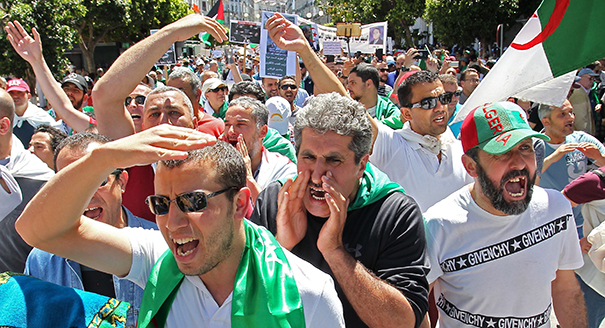Haizam Amirah-Fernández is a senior analyst at the Elcano Royal Institute and an associate professor at the Instituto de Empresa, both in Madrid. His research focus is on international relations, political Islam, and transitions to democracy in the Arab world. He has lectured at the Universidad Autónoma de Madrid, Georgetown University, Saint Louis University, Universidad San Pablo-CEU, and the Universitat de Barcelona. He has also worked for the United Nations in New York and for Human Rights Watch in Washington, D.C. Amirah-Fernández is a frequent commentator in Spanish and international media. Diwan interviewed him in mid-May to get his perspective on the recent protests in Algeria and their broader regional repercussions.
commentary
What Kind of Transition?
Haizam Amirah-Fernández discusses the ongoing protests in Algeria and their broader regional context.
by Ghida Tayara
Published on June 3, 2019
More work from Diwan



- commentaryLebanon’s Sunnis 2.0
Former foes in the community are realigning, many rallying around Saudi Arabian sponsorship.
- Mohamad Fawaz


 collectionArab Spring 2.0
collectionArab Spring 2.0Countries in the Middle East and North Africa have been witnessing a resurgence of the uprisings that had swept the region in 2010 and 2011. Many experts described what was called the Arab Spring as a failure, with countries descending into conflict or reverting back to autocratic tendencies, while populations abandoned protest squares. Yet with the unwillingness of Arab governments to tackle the many sources of dissatisfaction at home, citizens have returned to the streets to demand good governance and economic opportunities in twelve of the 22 Arab countries. Carnegie scholars in Beirut and throughout the region offer their analyses of this new wave of protests, explaining its causes, characteristics, and consequences for the politics, economies, and security of the countries involved, and for the broader region in general.
- commentaryThe Promise and Risks of Artificial Intelligence
Uneven investment in the technology will widen regional inequalities in the Middle East and North Africa.
- commentaryBetween the Sahel and the Maghreb
The Moroccan-Algerian rivalry is playing itself out in ties with Burkina Faso, Niger, and Mali.




